If one or more of your teeth are missing, there are a number of ways to replace them. An alternative to bridges, partials or complete dentures may be dental implants. Implants are used to replace missing roots and support artificial replacement teeth. They are comfortable and look like natural teeth.
What are dental implants?
A dental implant is an artificial root made of titanium metal. It is inserted into the jawbone to replace the root of the natural tooth. An artificial replacement tooth is attached to the implant. The implant acts as an anchor to hold the replacement tooth in place.
Who does this procedure?
If you are having an implant, your dentist may perform this procedure or refer you to a dental specialist who has further training in this area. Specialists who place implants are periodontists or oral and maxillofacial surgeons, also called oral surgeons. Specialists who place crowns, bridges and dentures on implants are called prosthodontists.
Who can get dental implants?
If you are in good general health, have healthy gums and have enough bone in the jaw to hold an implant, dental implants might be right for you. If your jawbone has shrunk or if it has not developed normally, you may be able to have a bone graft to build up the bone. A bone graft is a way of adding new bone to your jawbone. Your dentist or dental specialist will tell you if bone grafting can be done.
How dental implants are done
- Your dentist or specialist will carefully examine your mouth and take x-rays of your head, jaw and teeth to find out if dental implants are right for you.
- During the first stage of surgery, your dentist or specialist will put a dental implant into your jawbone beneath the gum tissue. The gum tissue is then stitched back into place. As the tissue heals, the implant will bond with the bone and attach to the gum. It can take several months to heal.
- During the second stage of surgery and once the tissue is healed, your dentist or specialist will attach an abutment to the implant. An abutment is a post that connects the replacement tooth to the implant. In some cases, the first and second stage of implant surgery may be done in one single stage.
- An artificial replacement tooth is made and your dentist or specialist attaches it to the abutment. It may take several appointments to properly fit the replacement tooth to the abutment.
- When replacing several teeth or all of your teeth, a fixed bridge is anchored to your dental implants. A bridge is a dental restoration that replaces one or more missing teeth by spanning an area that has no teeth. The bridge is held firmly in place by dental implants on each side of the missing tooth or teeth.
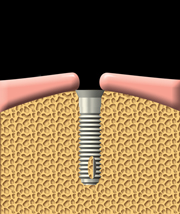
A dental implant is inserted into the jawbone.
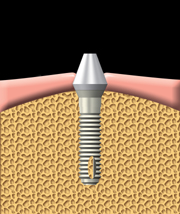
An abutment is attached to the implant.
The abutment connects the artificial tooth to the implant.
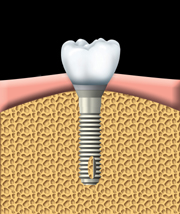
An artificial tooth is attached to the abutment.
Properly fitting the artificial
tooth may take several appointments.
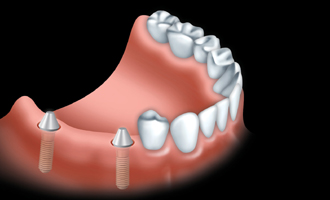
A fixed bridge is anchored to dental implants to replace one or more teeth.
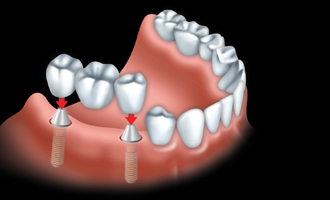
A fixed bridge is anchored to dental implants to replace all teeth.
Caring for my dental implant(s)
Because dental implants are placed in the jawbone, artificial replacement teeth attached to implants look and act much like natural teeth. Like natural teeth, implants need to be kept clean using a toothbrush and floss. After flossing, roll it up in a tiny ball and put it in the garbage. Never flush floss down the toilet. Your dentist will show you the proper cleaning procedure for implants. Regular dental checkups are important so your dentist can make sure that your bite is right and that your implants are not loose.
What else should I know?
- Several visits to your dentist or dental specialist may be needed until the process is done.
- Checkups will be scheduled during the following year so your dentist can be sure your implants are working properly.
- You will need to take very good care of your implants.
- Implants can cost more than other kinds of replacement teeth and might not be covered by your dental plan. But in most cases this is a one-time cost, unlike other kinds of tooth replacement procedures.
- Although rare, possible complications due to dental implants include bleeding, infection, numbness or injury to nearby muscles or the sinus cavity. In some cases, the implant may not be successful because it didn't bond to the bone.











